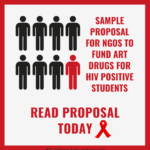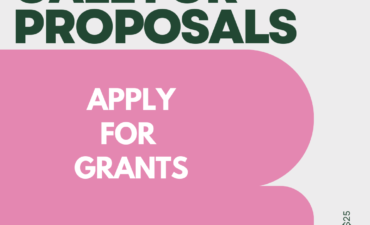Introduction: Sample proposal for NGOs to Fund ART drugs for HIV Positive students, In the pursuit of fostering inclusive and equitable educational opportunities, it is imperative to address the multifaceted challenges faced by marginalized groups, particularly HIV-positive students. As we strive to create environments conducive to learning and growth, it is essential to recognize the significant barriers hindering the academic success of individuals living with HIV/AIDS. Access to life-saving antiretroviral therapy (ART) drugs is not only crucial for their health and well-being but also plays a pivotal role in their educational journey.
In light of this pressing need, [Your NGO’s Name] presents this proposal with a fervent appeal for funding support from esteemed organizations committed to advancing social justice and human rights. Our initiative aims to bridge the gap in access to ART drugs for HIV-positive students, thereby empowering them to pursue their educational aspirations without compromising their health or dignity.
Through strategic partnerships and collaborative efforts, we envision a future where every HIV-positive student has unfettered access to the necessary medications, enabling them to thrive academically and contribute meaningfully to their communities. By investing in this initiative, our donors will not only transform the lives of individual students but also contribute to the larger goal of creating a more inclusive and equitable society for all.
In the subsequent sections of this proposal, we outline the rationale, objectives, implementation plan, and budgetary requirements of our initiative, underscoring the urgent need for action and the tangible impact of our proposed interventions. Together, let us embark on a journey towards a brighter future, where no student is left behind due to circumstances beyond their control.
A. Brief overview of the HIV/AIDS epidemic among students:
HIV/AIDS remains a significant global health challenge, affecting individuals of all ages, including students. Despite advancements in prevention and treatment, many students continue to grapple with the impact of the epidemic, facing stigma, discrimination, and barriers to accessing essential healthcare services.
B. Importance of Antiretroviral Therapy (ART) in managing HIV/AIDS:
Antiretroviral therapy (ART) plays a pivotal role in managing HIV/AIDS by suppressing the replication of the virus, improving immune function, and prolonging life expectancy. For students living with HIV, access to ART is not only critical for their health and well-being but also essential for enabling them to pursue their educational goals without compromising their academic performance or future prospects.
C. Purpose of the proposal:
The purpose of this proposal is to seek funding support from NGOs to provide ART drugs for HIV-positive students. By ensuring access to these life-saving medications, we aim to empower HIV-positive students to pursue their education with dignity and without the burden of untreated illness. This initiative not only addresses a critical need within the student population but also aligns with broader efforts to promote health equity and inclusive education for all.
Background (Sample proposal for NGOs to Fund ART drugs for HIV Positive students)
- Statistics and prevalence of HIV/AIDS among students globally and in the target area:
The global HIV/AIDS epidemic continues to affect individuals across all demographics, including students. According to the Joint United Nations Programme on HIV/AIDS (UNAIDS), an estimated 1.7 million adolescents (aged 10-19) were living with HIV worldwide in 2020, with approximately 86% of them residing in sub-Saharan Africa. Furthermore, recent studies have highlighted the disproportionate impact of HIV/AIDS on key populations, including young people, who often face heightened vulnerability due to social, economic, and structural factors.
In the target area [Specify the location], the prevalence of HIV/AIDS among students mirrors global trends, with a significant number of young people grappling with the challenges posed by the epidemic. Despite efforts to scale up prevention and treatment initiatives, disparities in access to healthcare services persist, exacerbating the burden of HIV/AIDS among student populations.
2. Current challenges faced by HIV-positive students in accessing ART drugs:
HIV-positive students encounter numerous barriers in accessing antiretroviral therapy (ART) drugs, which are essential for managing their condition and maintaining their health. These challenges include but are not limited to:
- Limited healthcare infrastructure: Many regions, particularly in low- and middle-income countries, lack adequate healthcare facilities and trained personnel to provide comprehensive HIV/AIDS services, including ART.
- Stigma and discrimination: HIV-related stigma remains pervasive in many communities, deterring students from seeking HIV testing and treatment services due to fear of social rejection and discrimination.
- Financial constraints: The high cost of ART drugs poses a significant barrier to access for many students, especially those from marginalized backgrounds or low-income families.
- Supply chain disruptions: In some areas, logistical challenges, such as stockouts of essential medications and disruptions in the supply chain, hinder consistent access to ART drugs for HIV-positive students.
3. Impact of untreated HIV/AIDS on students’ health, education, and overall well-being:
Untreated HIV/AIDS can have profound consequences for students, jeopardizing their health, education, and overall well-being. Without access to ART drugs and adequate medical care, HIV-positive students may experience:
- Deteriorating health: Untreated HIV infection can lead to a compromised immune system, increasing the risk of opportunistic infections and other HIV-related complications.
- Academic challenges: Illnesses associated with untreated HIV/AIDS, such as fatigue, cognitive impairment, and frequent absenteeism due to sickness, can disrupt students’ academic performance and hinder their ability to concentrate and participate in school activities.
- Psychological distress: The emotional toll of living with untreated HIV/AIDS, compounded by stigma and social isolation, can contribute to mental health issues, including depression, anxiety, and low self-esteem.
- Socioeconomic consequences: The long-term impact of untreated HIV/AIDS on students’ educational attainment and future employment opportunities can perpetuate cycles of poverty and social exclusion, further exacerbating existing inequalities.
Addressing the challenges faced by HIV-positive students in accessing ART drugs is paramount to safeguarding their health, promoting educational attainment, and fostering a supportive environment conducive to their overall well-being and success.
Objectives (Sample proposal for NGOs to Fund ART drugs for HIV Positive students)
- To ensure access to ART drugs for HIV-positive students in [target area]:
The primary objective of this initiative is to facilitate universal access to antiretroviral therapy (ART) drugs for HIV-positive students residing in [target area]. By removing barriers to medication procurement and distribution, we aim to ensure that every HIV-positive student has timely and uninterrupted access to life-saving treatment, regardless of their socioeconomic status or geographic location.
2. To improve the health outcomes and quality of life for HIV-positive students:
Another key objective is to enhance the health outcomes and quality of life for HIV-positive students through comprehensive HIV/AIDS care and support services. By providing access to ART drugs and promoting adherence to treatment regimens, we seek to mitigate the progression of HIV infection, reduce the incidence of opportunistic infections, and improve overall health outcomes among students living with the virus. Additionally, we aim to address the holistic needs of HIV-positive students by offering psychosocial support, nutritional assistance, and other ancillary services to enhance their well-being and resilience.
3. To reduce the transmission of HIV among students through effective management of the virus:
Furthermore, we aim to contribute to the broader goal of reducing the transmission of HIV among students by implementing strategies to effectively manage the virus and prevent its spread within educational settings. By ensuring that HIV-positive students receive comprehensive care and support, including regular viral load monitoring and adherence counseling, we can minimize the risk of HIV transmission within student populations. Additionally, through targeted education and awareness campaigns, we seek to promote HIV prevention behaviors, including condom use, voluntary testing, and linkage to care, thereby fostering a safer and more supportive environment conducive to HIV prevention and control.
By pursuing these objectives in tandem, we aspire to create a more equitable and inclusive educational environment where HIV-positive students can thrive academically, maintain optimal health, and contribute positively to their communities, ultimately advancing the global agenda for HIV/AIDS prevention, treatment, and care.
Proposed Activities (Sample proposal for NGOs to Fund ART drugs for HIV Positive students)
A. Identification and assessment of HIV-positive students in need of ART drugs:
The first step of our intervention involves the systematic identification and assessment of HIV-positive students in need of antiretroviral therapy (ART) drugs. Through collaboration with educational institutions, community-based organizations, and healthcare facilities, we will conduct targeted outreach efforts to identify and enroll HIV-positive students into our program. Utilizing confidential HIV testing and counseling services, we will assess students’ HIV status and determine their eligibility for ART treatment based on established clinical guidelines.
B. Procurement and distribution of ART drugs through established healthcare channels:
Upon identification and assessment, we will proceed to procure ART drugs from reliable pharmaceutical suppliers through established healthcare channels. Leveraging partnerships with local health authorities, medical facilities, and pharmaceutical distributors, we will ensure the timely procurement and distribution of high-quality ART medications to designated distribution points within the target area. Emphasizing the importance of supply chain management and inventory control, we will implement robust systems to track medication availability and facilitate prompt replenishment as needed.
C. Training and capacity-building for healthcare providers on HIV/AIDS management:
To enhance the capacity of healthcare providers in effectively managing HIV/AIDS among students, we will conduct comprehensive training and capacity-building workshops. These sessions will cover a range of topics, including HIV/AIDS diagnosis and treatment, ART adherence counseling, viral load monitoring, opportunistic infection management, and stigma reduction strategies. By equipping healthcare providers with the knowledge, skills, and resources necessary to deliver quality HIV/AIDS care, we aim to strengthen the healthcare infrastructure and improve the overall quality of services available to HIV-positive students.
D. Regular monitoring and follow-up to ensure adherence to ART treatment:
Ensuring adherence to ART treatment regimens is essential for optimizing health outcomes among HIV-positive students. To achieve this goal, we will establish a robust system for regular monitoring and follow-up, encompassing clinical assessments, medication adherence counseling, and viral load monitoring. Through personalized care plans and supportive interventions, we will track students’ progress in adhering to their treatment protocols and address any barriers or challenges they may encounter along the way.
E. Educational campaigns and awareness programs on HIV prevention and stigma reduction:
In tandem with our clinical interventions, we will launch educational campaigns and awareness programs to promote HIV prevention behaviors and reduce stigma associated with the virus. Utilizing diverse communication channels, including workshops, peer-led discussions, digital media, and community outreach events, we will disseminate accurate information about HIV/AIDS transmission, prevention methods, and the importance of early diagnosis and treatment. Moreover, we will engage students, educators, parents, and community leaders in dialogue and advocacy efforts aimed at challenging misconceptions and fostering a supportive environment free from discrimination and prejudice.
Through the implementation of these proposed activities, we aim to achieve our overarching objectives of ensuring access to ART drugs, improving health outcomes, reducing HIV transmission, and promoting a culture of acceptance and support for HIV-positive students within the educational setting. By addressing the multifaceted needs of this vulnerable population, we aspire to create lasting positive change and contribute to the broader efforts to combat the HIV/AIDS epidemic.
Budget (Sample proposal for NGOs to Fund ART drugs for HIV Positive students)
| Activity | Description | Budget Allocation ($) |
| Identification and assessment of HIV-positive students | Conduct HIV testing and counseling services | $10,000 |
| Procurement and distribution of ART drugs | Purchase ART medications from pharmaceutical suppliers | $50,000 |
| Training and capacity-building for healthcare providers | Organize workshops and training sessions for healthcare providers | $20,000 |
| Regular monitoring and follow-up | Implement monitoring systems and conduct follow-up assessments | $15,000 |
| Educational campaigns and awareness programs | Develop and disseminate educational materials and conduct events | $25,000 |
| Administrative costs | Overhead expenses including staff salaries, utilities, etc. | $20,000 |
| Contingency | Unforeseen expenses and emergencies | $10,000 |
| Total | $150,000 |
Please note that the amounts provided are for illustrative purposes only and may vary based on the specific context, geographical location, and scale of the program. Adjustments can be made to reflect the actual costs associated with implementing the proposed activities.
Monitoring and Evaluation (Sample proposal for NGOs to Fund ART drugs for HIV Positive students)
A. Indicators for measuring the effectiveness of the program:
- Number of HIV-positive students receiving ART drugs: This indicator quantifies the reach and accessibility of ART drugs to HIV-positive students within the target area. Monitoring the number of students enrolled in the program and receiving ART medications provides insights into the program’s coverage and impact on improving access to treatment.
- Adherence rates to ART treatment: Adherence rates to ART treatment measure the extent to which HIV-positive students comply with their prescribed medication regimens. By monitoring adherence rates through self-reporting, pill counts, pharmacy refill records, and viral load testing, we can assess the effectiveness of the program in promoting medication adherence and achieving viral suppression among students.
- Reduction in HIV-related illnesses and mortality among students: This indicator evaluates the program’s impact on reducing the incidence of HIV-related illnesses and mortality among students. By tracking changes in the prevalence of opportunistic infections, hospitalization rates, and mortality rates among HIV-positive students over time, we can gauge the effectiveness of the program in improving health outcomes and reducing disease burden.
B. Data collection methods and tools for monitoring progress:
- Routine data collection: Establishing a standardized data collection system to capture relevant information on the number of HIV-positive students enrolled ART drug distribution, and adherence to treatment protocols.
- Surveys and interviews: Conducting periodic surveys and qualitative interviews with HIV-positive students to assess their experiences with ART treatment, barriers to adherence, and perceived health outcomes.
- Pharmacy records: Monitoring medication dispensing and refill patterns through pharmacy records to track medication adherence and identify potential gaps in service delivery.
- Clinical monitoring: Utilizing clinical data, including viral load measurements, CD4 cell counts, and incidence of opportunistic infections, to assess changes in students’ health status and disease progression over time.
- Focus group discussions: Facilitating focus group discussions with healthcare providers, educators, and community stakeholders to gather qualitative feedback on program implementation, challenges, and areas for improvement.
C. Periodic reporting to donors on program achievements and challenges:
Regular reporting to donors is essential for ensuring transparency, accountability, and alignment with funding objectives. We will provide periodic progress reports to donors, highlighting key achievements, challenges encountered, lessons learned, and plans for addressing programmatic gaps. These reports will include quantitative data on program outputs and outcomes, as well as qualitative insights on program implementation and impact. Additionally, we will engage donors in ongoing dialogue and feedback sessions to foster collaboration and mutual learning, thereby strengthening our partnership in advancing the goals of the program.
Sustainability Plan (Sample proposal for NGOs to Fund ART drugs for HIV Positive students)
A. Strategies for long-term sustainability of the program beyond the funding period:
- Resource mobilization: Establishing partnerships with local businesses, philanthropic organizations, and government agencies to secure additional funding sources and in-kind support for the program.
- Income-generating activities: Exploring opportunities for income generation, such as establishing revenue-generating healthcare services or leveraging social enterprise models to fund program activities.
- Capacity building: Investing in training and capacity-building initiatives for local healthcare providers, educators, and community leaders to ensure sustainability of HIV/AIDS management efforts beyond the funding period.
- Advocacy and policy engagement: Engaging in advocacy efforts to influence policies and allocate resources towards sustainable HIV/AIDS management programs within the healthcare and education sectors.
B. Collaboration with local health authorities, educational institutions, and other stakeholders:
- Formal partnerships: Strengthening partnerships with local health authorities, educational institutions, and community-based organizations to foster collaboration and shared responsibility for HIV/AIDS management efforts.
- Task-shifting and decentralization: Empowering local healthcare providers and educators through training and capacity-building initiatives to take on greater roles in HIV/AIDS management within their respective institutions and communities.
- Multisectoral coordination: Facilitating multisectoral coordination and collaboration among stakeholders from health, education, social welfare, and other relevant sectors to address the complex and interconnected challenges of HIV/AIDS management comprehensively.
C. Integration of HIV/AIDS management into existing healthcare and education systems:
- Mainstreaming HIV/AIDS services: Integrating HIV/AIDS management services, including ART provision, counseling, and testing, into existing healthcare delivery systems to ensure continuity of care and sustainability beyond the programmatic interventions.
- Curriculum integration: Incorporating HIV/AIDS education and prevention modules into the curriculum of educational institutions to promote comprehensive sexuality education, HIV/AIDS awareness, and stigma reduction among students.
- Strengthening referral networks: Establishing robust referral networks and linkages between healthcare facilities and educational institutions to facilitate seamless access to HIV/AIDS services and support for students living with HIV.
By implementing these strategies, we aim to foster a sustainable ecosystem for HIV/AIDS management that transcends the duration of the program, ensuring continued access to quality care, support, and education for HIV-positive students and fostering resilience within communities to effectively respond to the challenges posed by the HIV/AIDS epidemic.
Conclusion
In conclusion, our proposal presents a compelling opportunity to address the urgent needs of HIV-positive students and transform their educational journey from one fraught with challenges to one filled with hope and opportunity. By seeking funding support from NGOs committed to social justice and human rights, we have outlined a comprehensive plan to ensure access to life-saving antiretroviral therapy (ART) drugs for HIV-positive students, improve health outcomes, and reduce the transmission of HIV within educational settings.
As we stand on the precipice of change, let us seize this moment to make a meaningful difference in the lives of HIV-positive students and pave the way for a future where every individual, regardless of their HIV status, can pursue their dreams without fear or discrimination. Together, let us embark on this journey towards a more inclusive and equitable society, where the right to education and health is upheld for all. Join us in turning the tide against HIV/AIDS and unlocking the full potential of every student, ensuring that no one is left behind in the pursuit of knowledge and empowerment.
Related Good Reads, Link
Hey, STEAL our Best Premium Content For Absolutely Free, Check Out the Links below
HOPE these will add value to your existing skills and knowledge
Our information bears no cost (it’s absolutely FREE), don’t let valuable information slip away.
Join our community of avid readers who are always in the know. Subscribe to our website; stay connected and engaged with the latest news, trends, and developments by subscribing today.
(PUSH the bell ICON)
Leverage the power of knowledge to propel your organization to new heights. Don’t miss out to explore our content
- Latest Funds for NGOs,
- NGO Jobs
- Resources (Helpful Guides and Courses)
- Premium Resources
- NGO related articles
Empowering Humanity through Funds, Resources and Collective Action
Sharing is Appreciated








